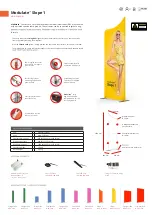
8 PKG08815-QRGMTL330
ENGLISH
INTRODUCTION
Thank you for choosing the MTL-330 Force Tester.
The MTL-330 manual tester is designed for basic
tension or compression force testing applications.
The MTL-330 has a force capacity of 330lbf (1500N).
PRINCIPLE OF OPERATION
Rotating the lever arm moves the rack and pinion
assembly 3" (76mm) per revolution. The MTL-330
has a full 6" (152mm) stroke.
The DFC or DFG Force Gage mounts to the gage
bracket. The gage bracket may be moved for longer or
shorter sample lengths. The force gage measures the
load as the rack assembly moves in either direction.
The rack and pinion assembly attaches to the column.
It may be positioned anywhere along the column.
A locking hub is used to prevent backlash during testing.
An optional digital scale assembly (p/n MTL-
SCALE330) may be attached to provide high resolution
deflection measurements.
SET UP FOR USE
Locate the MTL-330 tester where there is sufficient
clearance for testing and moving the lever arm.
You may permanently secure the base to the work
bench using flat head screws. Use the four corner
hole locations to secure to your work bench if
desired. Remove the hole plugs to reveal the 0.25"
clearance holes.
USING FIXTURES
Affix the test fixture to the force gage’s threaded
stem and to the MTL-330 rack and pinion assembly.
You may use either threaded test fixtures or fit the
force gage and the test frame with the optional
M6 clevis assembly (p/n SPK-CLEVIS-S). The force
gage bracket has been designed to ensure correct
centerline alignment.
MOUNTING FORCE GAGE
The DFC or DFG Force Gage is mounted to the gage
bracket using four M4 screws.
Position the force gage on to the gage bracket so that
the load cell stem points downward. Use the force gage
display “Flip option” to invert the display. Insert and
torque the four M4 mounting screws through the gage
mounting plate and into the force gage back panel.
Torque the screws to no more than 8.7 in-lb (1.0 N-m).
































